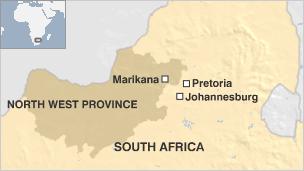South Africa Lonmin mine killings: Zuma announces inquiry
- Published
President Zuma: ''We have all be saddened and dismayed by the events''
South African President Jacob Zuma has announced an inquiry into violence at a mine in the north-east of the country, calling the deaths there "tragic".
Thirty-four people were killed when police opened fire on striking platinum miners on Thursday.
At least 78 people were injured in the confrontation.
Mr Zuma, who cut short a visit to Mozambique to visit the scene, said he was "saddened and dismayed" at the "shocking" events.
"I am convinced that the Commission of Inquiry will uncover the truth and facts will emerge," he said in a statement, external after meeting police and injured workers.
Visibly distraught, he said it was not a time for finger-pointing but he would try to make sure such a loss of life never happened again.
The president said it was a "cornerstone of hard-won democracy" to allow for peaceful protests adding that it was now "a day for us to mourn together as a nation - a day to start rebuilding and healing".
The violence took place at a platinum mine in Marikana, owned by Lonmin.
The BBC's Milton Nkosi in Johannesburg says South Africans are shocked and bewildered by what happened - 18 years after the end of the brutal system of apartheid.
Wives of the missing miners have been frantically searching for their loved ones, he says.
Some of them were chanting on Friday an old song from the anti-apartheid struggle in the Xhosa language: "What have we done, what have we done to deserve this?"
They wanted to know why the police used such force against protesters who were mostly carrying machetes, spears and clubs.
'Maximum force'
A strike at the mine began a week ago and had claimed the lives of 10 people, including two police officers, before the incident on Thursday.
Police were then sent to break up 3,000 miners - some armed with clubs and machetes - who had gathered on a hillside overlooking Marikana to call for a pay rise of about $1,000 (£636) a month.
The circumstances that led police to open fire remain unclear, but reports from eyewitnesses suggest the shooting took place after a group of demonstrators rushed at a line of police officers.
Police, armed with automatic rifles and pistols, fired dozens of shots, witnesses said.
Police chief Riah Phiyega said officers "were forced to use maximum force to defend themselves".
She said 259 people had been arrested on various charges.
The Association of Mineworkers and Construction Union (AMCU) accused the police of carrying out a massacre.
"There was no need whatsoever for these people to be killed like that," General Secretary Jeffrey Mphahlele told Reuters news agency.

The miners, who are currently earning between 4,000 and 5,000 rand ($484-$605), say they want their salary increased to 12,500 rand ($1,512).
South Africa is the largest platinum producer in the world and the dispute has already affected production.
Lonmin, the world's third-largest platinum producer, has encountered similar labour disputes at the Marikana mine.
In May 2011, the company sacked some 9,000 employees after what it described at the time as "unprotected industrial action". Lonmin and the NUM said all were later reinstated.
- Published17 August 2012
- Published17 August 2012